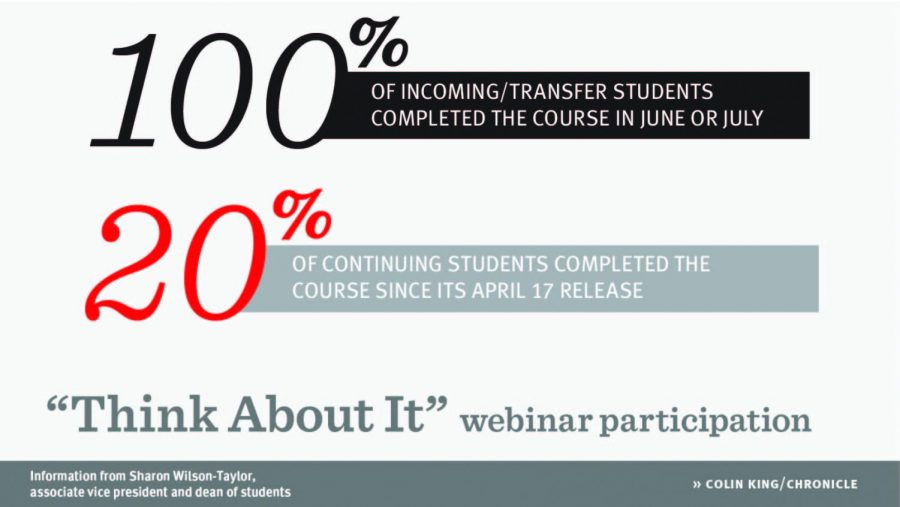Participation low in ‘mandatory’ sexual misconduct webinar
September 28, 2015
Near the end of the Spring 2015 Semester, the college launched “Think About It,” a mandatory webinar addressing on-campus sexual misconduct that students were instructed to complete by May 30.
Since then, only 20 percent of continuing students have completed the mandatory training, according to Sharon Wilson-Taylor, associate vice president and dean of students.
“You will receive reminders from me in the coming weeks,” said Mark Kelly, vice president of Student Success in an April 17 collegewide email announcing the webinar. “My office will also follow up individually with those students who have yet to finish the program.”
Copeland Smith, a sophomore art & art history major and member of the F Word, Columbia’s feminist activism group, said she did not complete the course because she was too overwhelmed with schoolwork, but she never received follow-up emails reminding her to complete the course. She suggested the college needs to push for more conversation about sexual misconduct, aside from the webinar.
“It is too prevalent of a problem on college campuses, especially in dorms,” Smith said. “If nobody is talking about it, nothing is going to change.”
However, Wilson-Taylor said the college sent follow-up emails to students who failed to complete the course, but they could not force students to take it.
“We aren’t going to say [to current students] you have to take this or you can’t register,” Wilson-Taylor said. “For the new students coming in, that was the point we took on them: To be part of the community you need to take [the module].”
Not all returning students had to complete the webinar, but 100 percent of all incoming and transfer students completed the module as part of the orientation process, according to Wilson-Taylor.
Grace Kinter, a sophomore business & entrepreneurship major and president of OFACE, a student group focusing on empowering women, said she completed the webinar and thought the module had an effective message that might be useful to students who were less educated on the topic.
“There are so many people that don’t understand rape culture,” Kinter said. “So yes, it was effective, but for me personally, it was obvious.”
Kinter said she thinks there are stronger ways to make students aware of sexual assault, especially in a creative learning environment like Columbia.
The “Think About It” webinar is one of the college’s many initiatives aimed at spreading awareness of on-campus sexual misconduct, Wilson-Taylor said.
A separate online training module was sent to all staff members to better educate them on the college’s policy, she said, adding that the college plans to release another module for full- and part-time faculty during the 2015–2016 academic year.
The college recently hired a new Health Educator and Title IX Deputy Coordinator, Kristen Bauer, to increase education about the college’s sexual assault and misconduct policies.
“It is no longer just part of someone’s job,” Wilson-Taylor said. “We need to be out there bringing attention to [the problem] and saying to the community, ‘In case you encounter or hear of a sexual assault, here is what you need to do.’”
Additionally, the college has hosted events like the Sept. 25 “Consent Rocks” concert to encourage students to discuss consent. The college shared assault statistics and showcased murals like “Stop Telling Women to Smile” on 8th Street and Wabash Avenue to strengthen awareness of street harassment. Also, she said the college’s Sexual Assault Awareness Education Committee, composed of faculty, staff and students, continues to work on a series of awareness education events.
“I think more students are becoming aware of the policy,” Wilson-Taylor said. “If they don’t take [the module, it is okay] as long as they know there is a policy and what to do. Our biggest help [is to] spread the word.”








